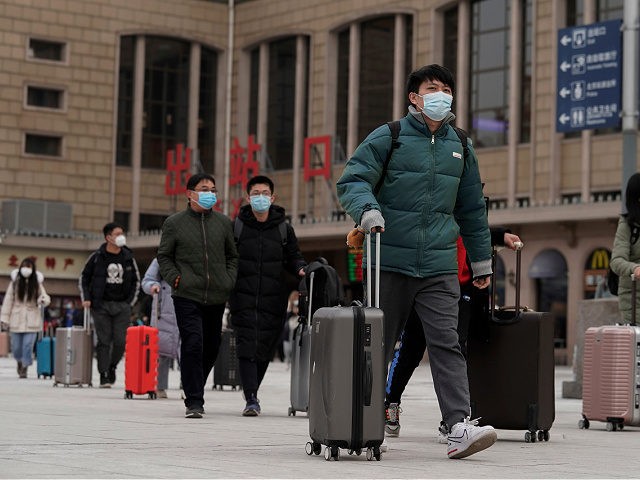Chinese authorities locked down 1.7 million people in Beijing on Tuesday as health officials scrambled to contain the spread of a new Chinese coronavirus resurgence across northern China that now threatens the nation’s capital.
“Daxing district in southern Beijing … has been sealed off from the rest of the country after six infections were found there. The total number of cases in Beijing stands at 15,” Bloomberg News reported on January 19. Beijing is home to over 20 million people and serves as China’s political center.
“Residents from five Daxing apartment complexes have been barred from leaving their homes from Wednesday [January 20],” Bloomberg relayed, citing local government officials. All kindergarten, primary, and secondary students across the district have been ordered to study at home. Gatherings of 50 or more people are now banned in Daxing, while “weddings should be postponed and funerals simplified,” the district government said, according to Agence France-Presse.
Daxing’s government has prohibited all 1.7 million residents of the district, which contains Beijing’s newest international airport, from leaving the national capital “unless they have received special permission from the authorities” and tested negative for the Chinese coronavirus in the past three days, officials said. Beijing’s subway operator has shut down the Tiangong Yuan metro station in Daxing, allegedly located near the residences of the districts’ six coronavirus patients.
Beijing’s coronavirus outbreak is part of a greater resurgence of the virus that has swept China since early January, affecting Hebei province, which surrounds Beijing, multiple northeastern provinces and Hong Kong. In Shanxi province, located west of Hebei, Jinzhong city announced “strict controls on gatherings” on January 11, “with weddings, funerals, public ceremonies, performances and other events banned after it recorded two asymptomatic [coronavirus] cases, both from Hebei.”
Chinese health authorities have detected at least 1,000 new Chinese coronavirus infections nationwide since the start of the new year, according to Bloomberg News on Tuesday. The new wave of cases emerged on January 5, a few days after the central city of Wuhan hosted an outdoor New Year’s Eve celebration attended by thousands of people. Chinese state media hailed the city’s mass gathering as a triumph and alleged proof that Wuhan authorities had successfully stamped out the community’s coronavirus outbreak, which emerged in late 2019. Wuhan’s coronavirus outbreak spread to greater China and precipitated the ongoing global Chinese coronavirus pandemic.
China’s National Health Commission claimed last week that the majority of new coronavirus infections in northern China are “imported.”
“They are all imported from abroad. It was caused by entry personnel or contaminated cold chain imported goods,” the health body said in a statement.
“The family cluster cases in Daxing has sounded the alarm that the epidemic situation is tough and complex,” Xu Hejian, a spokesman for Beijing’s municipal government, told reporters on January 19.
“We cannot loosen up on preventing imported cases and a domestic rebound,” he added.
The Chinese Center for Disease Control and Prevention (CDC) posited on Tuesday that alleged new strains of the Chinese coronavirus have made it especially difficult for officials to contain the latest outbreak.
“With mutated viruses more easily spread, anti-epidemic work becomes more difficult,” the Beijing-based CDC said.

COMMENTS
Please let us know if you're having issues with commenting.